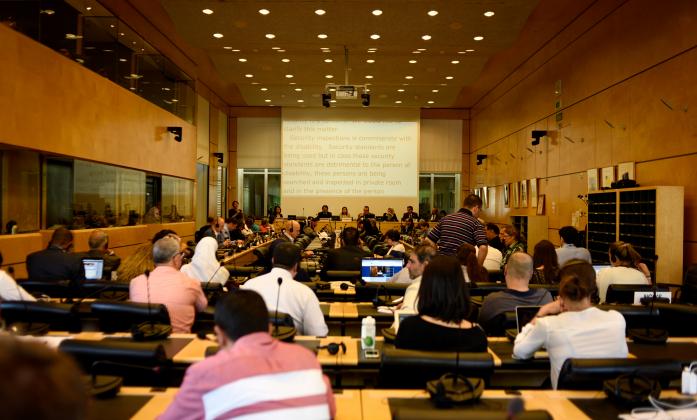This document seeks to provide a non exhaustive roadmap for national DPOs in their advocacy work to promote the full and effective...

An increased demand for additional guidance on CRPD implementation is coming from DPOs at country level as well as from all relevant actors involved with its implementation.
To better understand how to respond to this demand, the Department for Disability-Inclusive Development of Australia (AusAID) supported the IDA CRPD Implementation Guidelines Project, from 2010 to 2012.
The aim of this project was to start a process and create a momentum to commonly reflect on how to produce CRPD implementation guidelines to facilitate and support the capacity-building of DPOs on national and regional levels, with the active involvement and leadership of DPOs.
International Seminars and meetings
IDA has held a broad consultation process with DPOs, other civil society organizations (CSOs), international non-governmental organizations (INGOs), UN agencies, States, UN Human Rights Mechanisms, National Human Rights Institutions (NHRIs) and other relevant actors to identify key issues related with the implementation of the CRPD.
First Multi-Stakeholders Seminar
In December 2010, IDA held an “Expert Meeting on Identifying Key Challenges for the Full and Effective Implementation of the CRPD”. A background discussion paper was produced and disseminated prior to the seminar on key issues related to the implementation of the Convention. In addition, an in-depth review of documents on implementation related to the CEDAW, CRC, CESCR, ICCPPR and CAT, and on guidance documents on the CRPD was conducted in order to better understand existing guidelines on the CRPD and other UN human rights treaties.
The identified challenges were mainly related with needed reform of mainstream and disability-specific legislation as well as on the need to establish or modify policies in conformity with the CRPD. Furthermore, financial issues and the role of the UN system were debated during the Seminar. Beyond challenges, the Seminar highlighted new opportunities of work for IDA and DPOs, for instance, with respect to the United Nations Development Assistance Framework, OECD aid effectiveness work, disability rights budgeting and mainstreaming disability rights in the work of the UN agencies.
Civil Society Forum
Another important moment was the second Civil Society Forum, held by IDA and co-organized in cooperation with the Department for Economic and Social Affairs for the UN (DESA) in September 2011 during the Fourth Conference of States Parties to the CRPD. With an interactive agenda and a diversity of participants, the Forum provided a high level of shared experiences on the implementation of the CRPD.
Second Multi-Stakeholders Seminar
In November 2011, IDA hosted a second international Seminar, the “Workshop to establish a roadmap for CRPD implementation guidelines”. In addition to reviewing key issues and challenges identified so far, the aim of the workshop was to seek the inputs, experiences and views of different stakeholders on a proposed roadmap to establish implementation guidelines.
Webcast and virtual discussions
There were two innovations during the workshop: the live webcast of the sessions and a special online forum, allowing virtual participants to interact and contribute to the workshop sessions. The meeting can be watch under www.livestream.com/ida_crpd
The interactive format of the workshop facilitated participants to actively share their experiences and views regarding the main challenges of CRPD implementation as well as proposing ways to go forward, for instance, by providing gradual guidance on CRPD implementation through a series of modules, instead of through a unique guidelines document.
New ways to go forward
Thanks to the Implementation Project, IDA identified further ways to disseminate and share knowledge on CRPD implementation, for instance:
Newly establishing a journal on CRPD implementation
Strengthening and/or establishing new thematic networks
Restructuring the Civil Society Forum of the annual Conference of States Parties
Implementing the Training of Trainers, Advisors and Leaders Program (ToTAL)
Conclusions
The main conclusions of the Guidelines Implementation Project reveal that the process itself is one of the most important aspects of the production of the guidelines.
The conclusions place DPOs as key actors at the forefront of the elaboration process, as envisaged by the CRPD. The guidelines process should mainly target national DPOs allowing them to be better and further engaged in supporting CRPD implementation and in monitoring its implementation. On the other hand, DPOs should be involved throughout the entire elaboration process through broad consultation.
The elaboration of comprehensive guidelines on the CRPD implementation will be an enormous and challenging task, which requires the active participation of a diversity of stakeholders and certainly significant additional resources. The newly created Multi-Donor Trust Fund (MDTF) can and should become a source of funding for the development of such implementation guidelines.
